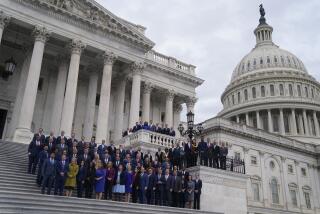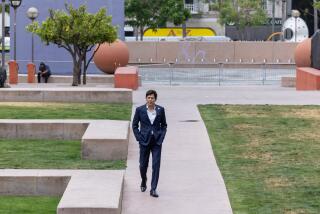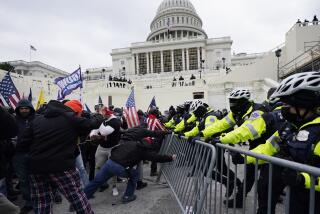D.C. could be represented among Capitol statues -- if nowhere else
WASHINGTON --The District of Columbia often feels like Rodney Dangerfield. Its license plates read “Taxation Without Representation” to call attention to its long-standing gripe that its residents pay federal taxes but have no vote in Congress.
But soon D.C. could get a bit more respect.
A bill moving through Congress would allow the city to add a statue of abolitionist Frederick Douglass to the U.S. Capitol’s hall of fame.
Since the 19th century, each state has been permitted to display two statues of distinguished figures in the National Statuary Hall Collection, a popular tourist attraction in the Capitol and its new visitors center. Honorees include obscure figures such as Nebraska’s J. Sterling Morton, founder of Arbor Day, and Oklahoma humorist Will Rogers, whose visage faces the House of Representatives, supposedly in keeping with his famous advice to “keep an eye on Congress.”
The District of Columbia has pushed for years to be represented in the hallways as well as the halls of Congress.
The D.C. Commission on the Arts and Humanities a few years ago commissioned statues of Douglass, whose one-time home near the Capitol is a national historic site, and Pierre L’Enfant, the architect and engineer who designed the capital city, in hopes of placing their likenesses in the Capitol.
The bronze statue of Douglass, created by Steven Weitzman of Maryland and now located in a D.C. government building, depicts the abolitionist standing next to a lectern delivering a speech while clutching a paper.
The House in 2010 approved a bill to allow the District of Columbia and U.S. territories to one statue each in the Capitol. But the measure never made it before the Senate.
A spending bill recently approved by the Senate Appropriations Committee would allow the District to place the Douglass statue in the Capitol. The measure still must be approved by the House and Senate.
Supporters of placing Douglass’ likeness in the Capitol, led by Eleanor Holmes Norton, the district’s nonvoting delegate to the House, have said it would provide for greater diversity in the collection of statues.
Norton has said that a statue for the District also would offer its residents “the opportunity to enjoy the same pride that all other citizens experience when they come to their Capitol -- the opportunity to view memorials that commemorate the efforts of residents who have made significant contributions to their jurisdiction and to American history.”
ALSO:
Think you know about crime in the U.S.? Think again
El Paso boxing match draws crowd despite fears of violence
New Yorkers hold silent march to protest ‘stop-and-frisk’ policy
More to Read
Sign up for Essential California
The most important California stories and recommendations in your inbox every morning.
You may occasionally receive promotional content from the Los Angeles Times.











